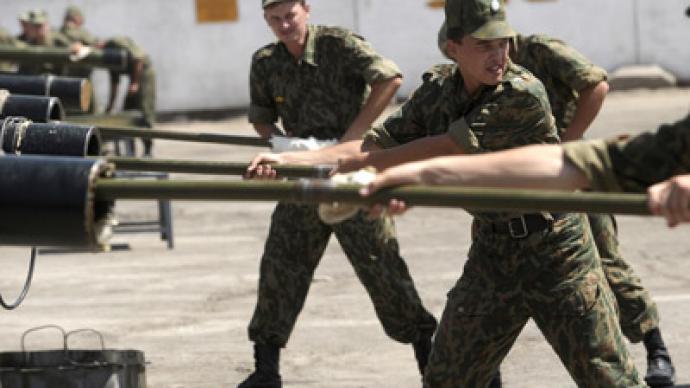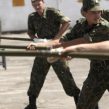
Russo-Tajik Relations Cool Over Failure to Ratify Basing Agreements
Publication: Eurasia Daily Monitor Volume: 10 Issue: 85
By:

On April 27, Russia’s Federation Council approved a military basing agreement between Tajikistan and Russia (Ozodi, April 30). The agreement signed last October extended the lease on Russia’s bases in Tajikistan, home to the 201st Motorized Rifle Brigade, until 2042 (see EDM October 10, 2012). Despite being signed by Presidents Vladimir Putin and Emomalii Rahmon and passing through both the Russian Duma and Federation Council, Tajikistan’s parliament has been slow to ratify the agreement (Ozodi, April 30).
Tajikistan’s hesitance can be attributed to two factors. The first is the failure of the Russian parliament to approve three agreements related to last October’s deal. In exchange for the lease extension, Russia agreed to three concessions 1) exempting 1 million tons of Tajikistan-bound fuel from customs duties, 2) providing $200 million worth of military equipment and aid, and 3) extending the period a Tajikistani migrant worker can be in the country before registering from 3 to 15 days (Ozodi, April 19).
In addition to Russian foot dragging, analysts suggest that Tajikistan may be delaying the ratification of the basing agreement in an attempt to extract further last minute concessions. Throughout negotiations, Tajikistani politicians and media were quick to point to the recently ratified basing agreement between Kyrgyzstan and Russia, noting that in exchange for an extension until the year 2032 (ten years less than Tajikistan) Kyrgyzstan will receive not only military assistance, but $489 million in debt forgiveness, as well as Russian investment in five hydroelectric projects (Ozodi, April 30).
Dushanbe also seems to perceive the psychological value of the Russian base. The trio of bases, which houses 7,000 troops, is collectively Russia’s largest foreign military facility (Ozodagon, April 23). Additionally, as the fate of Russia’s naval facility in Tartus, Syria, becomes increasingly uncertain, Russia is particularly sensitive about not losing any more ground. While only a portion of Tajikistan’s population identifies strongly with global Sunni issues, a growing number of Tajikistanis are outspokenly critical of Russia’s support for embattled Syrian President Bashar Assad (SunniNews March, 3, 2012). Seen through the lens of their own negotiations, Russia’s support for Assad’s brutal crackdown does not play well in Tajikistan; as noted by commentator Ali Mastov, “Moscow is ready to sacrifice the last Syrian so as not to give up Tartus” (Ozodagon, April 23).
In retaliation for failing to sign the basing agreement, Russia has resorted to threatening Tajikistani migrant laborers. On April 14, Russian border officials inspected trains from Tajikistan carrying migrant workers and allegedly discovered many health and sanitary violations (BBC Tajiki, April 15). Russian Deputy Prime Minister Dmitry Rogozin reportedly declared that the trains pose “a serious threat to the sanitary health of the whole nation” and should “never be allowed into Russia” (RIA Novosti, April 16). This incident sparked a diplomatic and public backlash in Tajikistan followed by a fresh volley of criticism from Russia, including an episode of the Russian television show “Special Correspondent” entitled “Satan Train,” which was not received well in the Tajikistani media (Ozodagon, April 25; BBC Tajik, April 24; Millat, April 20).
Additionally, in a television appearance on April 18, Vladimir Zhirinovsky, State Duma deputy and leader of the nationalist Liberal Democratic Party of Russia, lambasted Tajikistan’s recalcitrance, threatening that if the Central Asian republic does not approve the agreement, “we [Russia] will not let any more migrant workers in. Then what will Rahmon, the leader of this country, do? He knows all too well that, in this event, work will dry up. Afghan Islamists will overrun the country and hang him in the center of town just like [Mohammad] Najibullah [former president of Afghanistan installed in the 1980s by the Soviet Union]” (https://kemyaesaadat.com/index.php?option=com_content&view=article&id=4985:1&catid=69:1&Itemid=#comment-2271).
In response to blowback from Tajikistani politicians, Russian diplomats distanced themselves from Zhirinovsky’s comments, pointing out that, as an opposition politician, he does not represent official state policy (Ozodagon, April 24). However, while Russian officials may communicate more tactfully, both Zhirinovsky’s calculations and sentiment seem representative of Russian policy. Despite having reduced its dependency on Russian fuel, Tajikistan’s overwhelming economic reliance on the estimated $3.5 billion remitted annually by more than 1 million migrant workers gives Russia a firm upper hand in negotiations (Ozodagon, April 23). Furthermore likening Rahmon to the former, Soviet-installed president of Afghanistan, Mohammad Najibullah, is indicative of the persisting colonial sentiments that Russia harbors toward what it considers its “Near Abroad.”
In the short term, Russia’s tactics provoke a nationalistic response in Tajikistan, which in turn arguably rallies support for President Rahmon. However, in the long run, failure to extract concessions or at least save face will most likely only increase popular dissatisfaction with him as a ruler. On the other hand, if Rahmon were to seize popular opinion and snub Russia, the victory would be short lived as Moscow would most likely retaliate with draconian immigration and economic measures, which could threaten the stability of the country. Ironically Tajikistan’s fragility and the possibility of Zhirinovsky’s prediction coming true is probably Rahmon’s strongest card against the Russians. While Russia certainly has the economic, to say nothing of the military/covert, leverage to threaten Tajikistan’s stability, doing so would also threaten Russia’s interests. This point was emphasized in the parliamentary debate over the basing agreement with Tajikistan, in which proponents such as Head of the State Duma’s Defense Committee Viktor Zavarzin argued that peace and stability in Central Asia were integral to Russian security (Ozodi, April 19). In all likelihood, Tajikistan will eventually capitulate—however, not before the perceptions of the asymmetric relationship between Moscow and Dushanbe engender resentment and further erode Russian soft power at a popular level.




